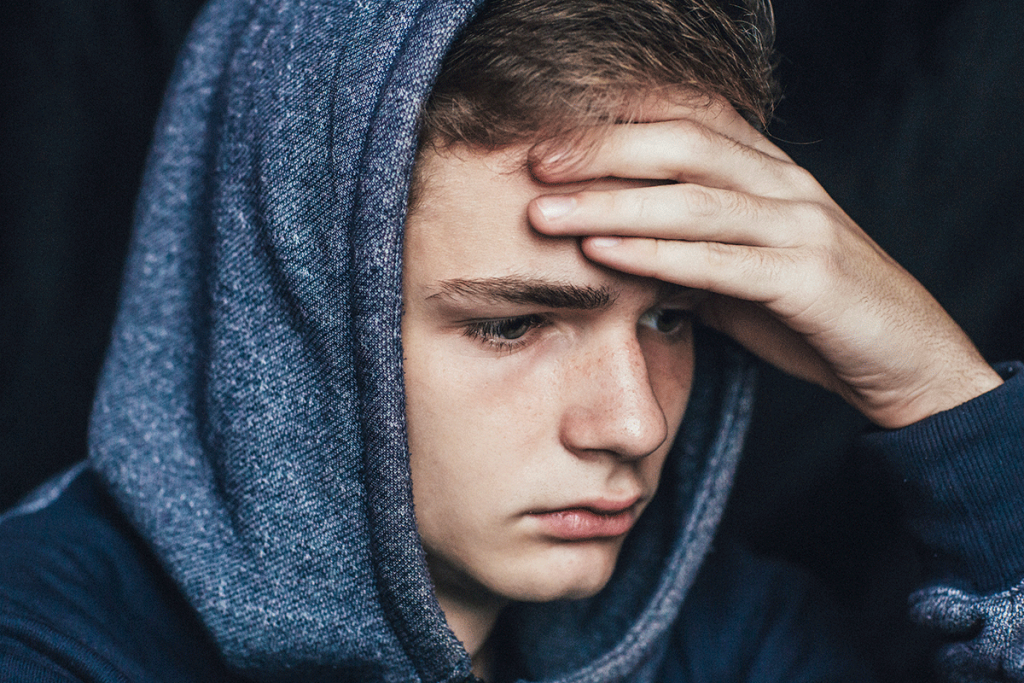Traumatic events like abuse, natural disasters, and auto accidents leave lasting scars on those who experience them. Surviving one of these incidents during childhood can be especially challenging since children haven’t developed coping mechanisms like adults. As they grow, adolescents and teens may start to show signs of PTSD. If you recognize symptoms in your teen, treatment can help them process their trauma and find a better way forward.
What causes PTSD in teens?
PTSD doesn’t just affect military servicemembers. Anyone can develop it after experiencing a traumatic event, even teens. This could include:
- Severe bullying with threats to their life or health
- Invasive medical procedures
- Car accidents
- Natural disasters
- School, domestic, or community violence
- Abuse and/or neglect
Changes occur in the brain and body as a reaction to the traumatic event.1 Areas of the brain may become more active or less active, producing changes in behavior and thinking. Meanwhile, stress hormones in the body will be altered, affecting how the body responds to stress. Some studies show that individuals with PTSD have similar changes to those who experienced a traumatic brain injury.
Symptoms of PTSD in teens
PTSD in teens looks similar to that of adults, but there are some key differences.
- Intrusive thoughts, memories, or dreams of the traumatic event. Adolescents may also lean into re-experiencing events through things like video games.2
- Avoidance behaviors that steer away from things that remind them of the traumatic experience. Teens may isolate or shut down and may not know why. If they haven’t processed their traumatic experience, they may not know what actually triggers them.
- Emotional numbness can make it hard for teens to feel anything at all. They may not feel happy when they should or come off apathetic when they’re sad or angry.
- Irritability and/or aggression, like lashing out or arguing, might show up because PTSD makes it hard to regulate emotions. It may also be because it’s harder to classify things as threatening or not.
- Impulsive actions—substance use, risky sex, self-harm, aggression—are common among both adults and teens with PTSD. For teens, these may be the only ways they can express anxiety, sadness, or hyperarousal (always being on edge).
- Academic issues can show up when your teen is struggling with PTSD. Even if you don’t notice any changes at home, you may get calls about them skipping class, being late or disruptive, or having bad grades.
These symptoms may show up immediately after a traumatic event, but it’s also possible for them to develop months or even years later. It’s essential to pay attention to any changes in your teen’s behavior, especially if they have experienced trauma in the past.
What happens if PTSD goes untreated?
Trauma has serious impacts on the brain and body. Left untreated, it can affect memory, concentration, and how your child regulates their emotions. As they transition into adulthood, these issues will impact their job performance and their relationships. Risky and impulsive behaviors can also become their go-to coping mechanisms. Instead of processing their emotions, they might use drugs or alcohol to numb feelings, or they may stay in toxic relationships or even withdraw from their partners completely.
How you can help your teen
As a parent, you can play a crucial role in helping your teen manage their PTSD. Here are some steps you can take:
- Educate yourself on the signs and symptoms of PTSD so you know what to look for.
- Talk openly with your teen about what they are experiencing and validate their feelings. Let them know that it’s okay to feel scared or overwhelmed, angry or sad.
- Help create a calm, safe, and predictable environment for your teen. This can help reduce their anxiety and provide a sense of security.
- Encourage your teen to participate in self-care activities like exercise, journaling, or spending time outdoors.
It’s also important to consider professional treatment. Even though some children are able to process their experiences on their own, not all do. Some live with the long-term effects of PTSD.
How Family First addresses teen PTSD
We understand the unique challenges that come with treating teen PTSD. Our experienced therapists use evidence-based treatments to help teens process their trauma and develop healthy coping mechanisms. This includes trauma-informed individual, group, and family therapy, as well as techniques like eye movement desensitization and reprocessing (EMDR) and cognitive-behavioral therapy (CBT).
Clients engage with a personal clinical team that supports their treatment goals and addresses any co-occurring disorders. By checking in with a nurse every morning during treatment and a psychiatrist weekly, we monitor their progress in order to make any adjustments. We may also utilize medication management, but never without parents and teens understanding how the medication works and its side effects.
Reach out to us today
Family First has multiple levels of care that support teens 12-18 who have PTSD. Our boys-only residential program offers 24/7 support at our safe campus in South Florida. The partial hospitalization program (PHP) is co-ed, providing help to boys and girls.
Your teen can process their trauma and find a better way forward—one that they’re confident in. Call us at 888.904.5947 or complete our simple online form now to get in touch with our team and start building a plan for your teen’s well-being.
Footnotes:

